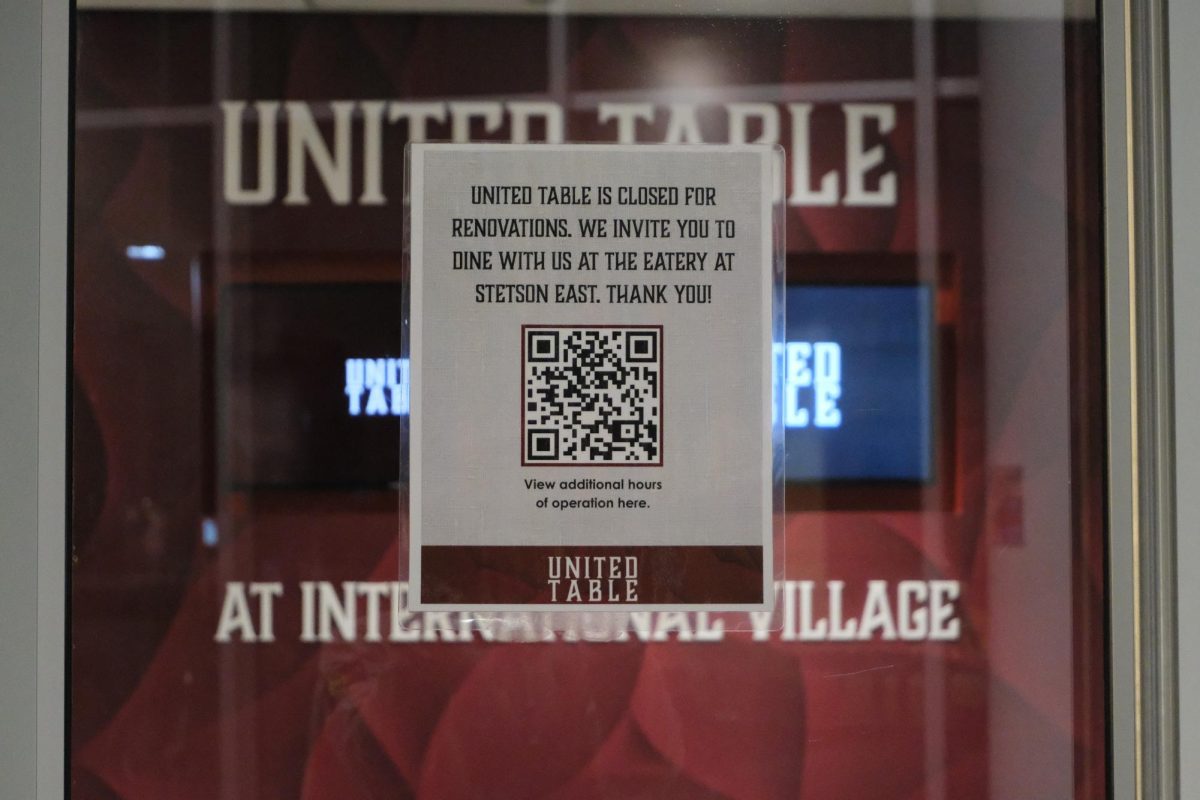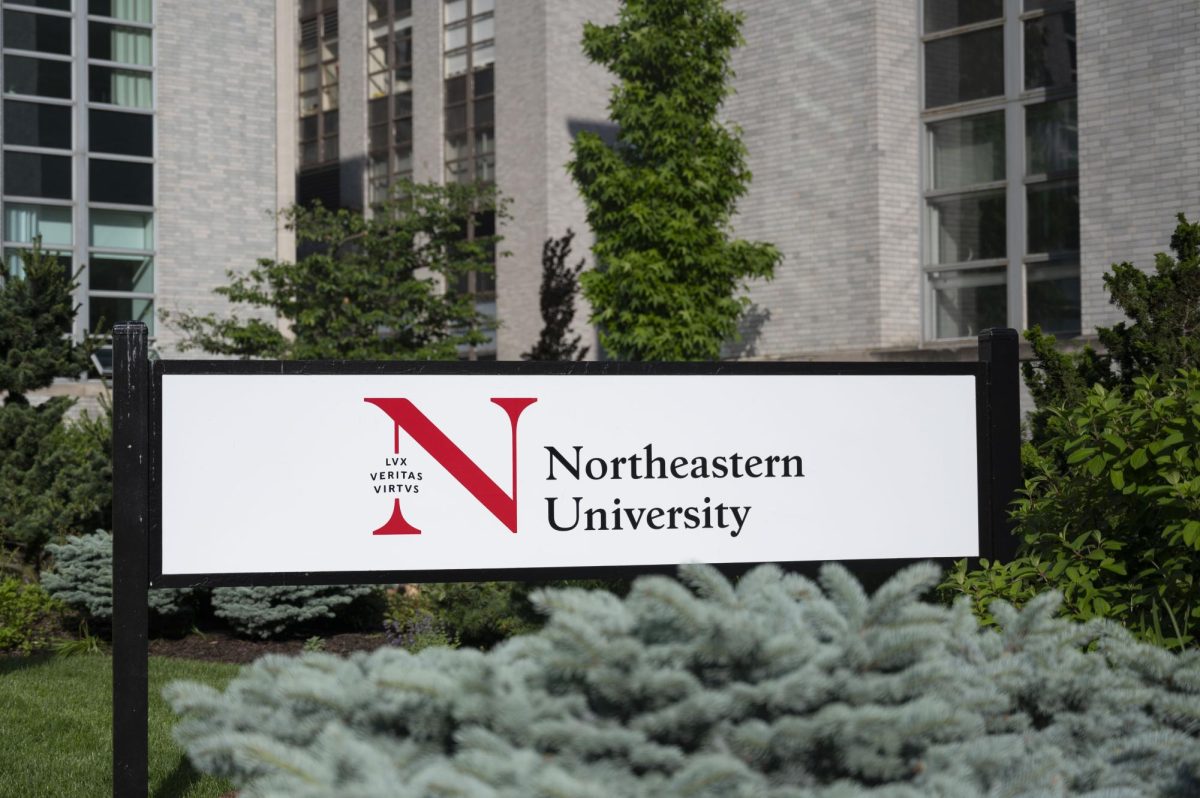
By Zack Sampson, News Staff
Husky Link blasts news to more than 2,000 members of the Northeastern community through Twitter daily, but few followers know the person behind the account — former Student Body President and 2011 graduate Ryan Fox.
When he graduated from Northeastern in May, Fox took campus news aggregate Husky Hub with him, but some of his ex-colleagues in the Student Government Association (SGA) think he did so as a thief, not an inventor.
Husky Hub morphed into Husky Link after Fox changed the name upon consulting with university counsel this summer about intellectual property rights.
“To be quite frank, I don’t think students give a crap who’s tweeting or who is breaking the news to them — they just want to know what’s happening on campus, and that’s why this Twitter has over 2,000 followers because it clearly is effective,” SGA’s Vice President for Academic Affairs Dani Wojdyla said. “It’s just, it’s no longer SGA endorsing that, and as our main mission statement to be a voice for the student body, that’s been taken away from us — those are followers that Ryan Fox now has that were created under the assumption that it was a student government initiative. That doesn’t sit well with me.”
EXPLORING POSSIBILITIES
Fox said he thought up the project, which featured a plan for a website, in summer 2008. He said “it was being explored as an SGA project” on and off for a number of months from then until his final term in the spring. At this time, Fox decided the project would not work with the association and took Husky Hub — what some top association officials say is SGA intellectual property — with him after graduation.
Anthony Golia, SGA’s comptroller, said Fox worked and documented his effort to develop Husky Hub as a product for the association extensively. It became an SGA product he said, and when Fox took that, he robbed the organization of its intellectual property.
“I think it was an idea that started in SGA, and it was more than an idea — it was, if you look at his monthly reports, he made the Facebook, he made the Twitter, all of that stuff had been operating as an SGA product,” Golia said. “I mean, if he wants to make the argument that Husky Hub was started afterwards, I still think that those products were SGA products, so by keeping that, that was certainly theft.”
Fox said SGA never officially took on Husky Hub, so he is the rightful owner of any intellectual property relating to the concept. He said Northeastern’s university legal counsel, which was brought in to assess the matter in late summer confirmed that Husky Hub was not SGA’s property.
“The intellectual property was always mine, and this is something that was discussed with legal,” Fox said. “Because SGA never assumed the project, it never took it on, it never owned it, the intellectual property resides with the inventor of the idea.”

SGA TIME AND EFFORT
According to association records, Fox first publicly mentioned Husky Hub in a September monthly report from 2010. He wrote then that he was “continuing to address technical issues” on a “campus communication project” known as “The Husky Hub” which was set to launch that fall.
The association also updated the job description for its director of web development in September, with explicit provisions included to address Husky Hub.
Under the new guidelines, the director would specifically “work with the President to develop and maintain Husky Hub.”
Not long after Husky Hub sent its first tweet on Nov. 2, 2010 — encouraging students to hit the polls on Election Day — Fox wrote in his November monthly report that the Husky Hub project was “continuing, as time allows,” now pushed back for a “spring launch.” He also noted SGA started using a “Twitter and Facebook page for the new service during November” and had received “a great response to date.”
His reports for December and January echoed similar statements about the ongoing development of Husky Hub, and after early 2011, he never documented work on the project again.
Fox asserts that such mention of his work does not indicate that Husky Hub was ever actually an SGA project. Rather, he maintains it was just an “exploration” of his personal idea and how it would develop with the association.
When the job description was changed for the director of web development, Fox said he was not aware that Husky Hub was a part of the new roles.
“I found out about that afterwards, I was not aware of that when that was approved,” he said.
Fox said he might not have been at the e-board meeting or have had a chance to read over the job description before the vote.
After learning of the change, Fox said he advocated that the cabinet not appoint a director of web development for that year. The position is one the executive board chooses to fill on an annual basis — the association did not have a person in this position last year and does not this year.
At the time, Fox said he told the e-board he was not comfortable with specifying a job description for Husky Hub — a project that he said was not definitely a part of the association yet.
TECHNICAL DIFFICULTIES
For SGA to officially gain control over the Husky Hub concept, Fox said the association would need to “deliver successful proof of concept.” He said this essentially meant SGA would need to have shown that they could support the main piece of the Husky Hub project — a website “that actually performed.”
But a number of technical setbacks prevented Fox and former SGA Chief of Staff Mike Splain, who worked closely with Fox on the effort, from creating a website according to his monthly reports. Husky Hub was originally destined for the Northeastern server at www.neu.edu/huskyhub, so he and Splain were forced to work within the constraints of the Northeastern server. Despite multiple expected beta launches, Fox said they “had a lot of issues” and just could not meet deadlines.
Senate minutes show that at SGA’s meeting on Sept. 20, 2010, Splain noted he and Ryan were “near completion on the beta phase of Husky Hub, an online resource for all students to use combining information such as where students can dine around campus and when they are open.”
At the Nov. 29 meeting, Splain again addressed Husky Hub, saying he and Fox “just got a new server for the Association,” and planned to migrate a few projects over, including the association’s website and Husky Hub.
The association proved at this time that it did not “have people willing to work on” Husky Hub, Fox said, as he and Splain were essentially developing it alone and could not keep up with server issues and technology changes.
Though Fox said SGA simply did not display the interest or manpower necessary to sustain the project, numerous top SGA officials said members of the association were in fact very interested and willing to work.
Taylor Cotter, SGA’s elections chair and last year’s executive director of communications, said she recognized many people within the organization who were willing to help on the creative implementation of Husky Hub, though SGA may not have had the technically skilled individuals needed to program the actual website.
“When you’re making a website that’s all technical, and you’re asking people to code back end stuff, there’s not going to be interest in that,” she said. “But there was significant interest in this as an overall idea — there were people who were creating content or thinking of ideas for content.”
Cotter said as communications director, she and her team “never really got that far into plans” for Husky Hub, but they “were coming up with ideas” and hoped to use the website as a platform for outreach.
Outside of formal meetings, Cotter also said the SGA office was a venue for frequent discussion about Husky Hub.
“Maybe there would be three of us that say, ‘Oh, no one can find ResMail hours anywhere.’ Oh, and then Ryan would be like, ‘ResMail hours? Oh that will go on Husky Hub,’” she said.
In a “very specific” instance Cotter said she recalls from September 2010, she wanted one member of her team to compile a list of places in the area around Northeastern with student discounts. After announcing this, Cotter said Fox explained how another senator already did that in the previous year and it was supposed to go on Husky Hub.
Fox’s successor, Mike Sabo, said he views Fox’s assertion that SGA never displayed interest in Husky Hub as “categorically wrong.” He said his recollection of the project is that it was somewhat of a “covert operation” and the executive board never had much involvement.
“I think that’s completely ludicrous to suggest otherwise, in terms of ‘we have no interest in it,’ it was never brought up,” Sabo said. “It was like this thing going on in the background that he was doing unknown work on that it would appear on these official documents but it was never shown to us or anything.”
Sabo pointed to Fox’s mid-year report presented at the senate meeting Jan. 10, in which he noted “the Husky Hub beta launch” was “ongoing.” He said this mention clearly demonstrates that Fox was working on Husky Hub as an SGA project, as he included it in the public record of his work as student body president.
Fox said he and the rest of the 2010-11 cabinet officially agreed the Husky Hub project would not succeed under SGA in discussions sometime around February.
“It was clear to me, and I had some discussions with everyone else on the cabinet about the future role of it in the association, and everyone kind of agreed that it wasn’t able to take off and I was a big proponent behind it, and if I was graduating that the odds of it succeeding under SGA were not good,” he said.
But neither Sabo nor Cotter, both members of last year’s executive board, remember any such conversations. Cotter confirmed to The News that executive board meeting minutes from January, February and March show no mention of Husky Hub.
Fox said at this time he was looking at transitioning his duty and considered the Husky Hub project “dead” and “there was no future plan for it at that point.” But as the semester continued and he continued to maintain the Twitter account, Fox said he began to reconsider the original intent of the communication project and consulted with a few people, eventually deciding to take Husky Hub on as an individual project after graduation.
In late spring, several current members of SGA’s executive board said Fox recruited their services for the independent Husky Hub project, including current Executive Vice President Will Pett, Vice President for Student Involvement Matt Crimmins, Chief of Staff Terry MacCormack and Executive Director of Communications Kelly Dwyer. Last year’s Chief of Staff Splain also said he was contacted but did not have any more time to devote to Husky Hub.
All said they met with Fox during the summer and had varying levels of involvement with the project.
MacCormack, Crimmins and Pett said time constrains kept them from being involved right now.
CONFLICT OF INTEREST
Dwyer said Fox reached out to her in the spring as well, looking for someone to help with Husky Hub’s design.
“I met with him, I think once or twice, to talk about his ideas but I never really shared any of my own and I didn’t do any physical work on it,” she said. Dwyer said she resigned from her role with Husky Link in the past few weeks due to potential conflicts of interest.
“I’ve realized that it was a huge conflict of interest basically because my job as executive director of communications is communication, making sure that SGA is shed in a positive light and that students know about all the good work that we do,” she said. “Not being able to control what’s being said through Husky Link because it’s not SGA, but because students still think that it is SGA, there’s definitely a conflict of interest there.”
Dwyer’s concern about the integrity of the SGA cabinet given current member’s involvement with the Husky Hub project, including Cotter and the academic affairs vice president, Wojdyla.
After noting the e-board often has access to information before the rest of the student body, Wojdyla saif she is concerned that those helping Fox might divulge sensitive information.
“Currently as it stands, there are various people that are doing work for it, and that is not sitting well with me,” Wojdyla said. “To have a website like this that is always trying to break the news and be the front-runner in telling Northeastern students what’s going on around campus, and then to also have these tools available to them — where they can break the news — they can compromise themselves and others as a result.”
Fox said he is not the only person tweeting from the Husky Link account and has a “mix” of current students assisting him with the project. He would not release names or the number of people he has worked with because he is still in discussions about involvement. He said some of the students he spoke to are current members of SGA, though he has taken caution to ensure the preservation of the organization’s integrity.
“I’ve made it very clear, anyone that we’re in discussions with, I don’t want to know that information. I’ve been in that role, I’ve heard the information, I know what’s going on, but if we find something, if someone throws it our way, I want to be able to honestly say that it was public information or that it was provided to us by someone else and not put anyone’s integrity in question,” he said.
SGA’s cabinet expressed concern that students who follow Husky Link will confuse it with Husky Hub, which many understood to be an SGA-operated Twitter account.
Through Cotter, the association wrote to Fox in June to stress that the association wished to clarify its separation from Husky Hub after a tweet from the account knocked The News’s circulation and drew ire.
“We discussed as an Executive Cabinet tonight and we decided that we wanted to make sure that SGA is no longer affiliated with Husky Hub,” Cotter wrote. “There has been some negative reaction to things you Tweeted in the past week, especially with the News, and we came to the conclusion that this is detrimental to our image.”
Fox said he then sent a tweet out and has been upfront with any followers who question the source of Husky Link, explaining that the account is independent of the university.
But he did acknowledge that some students may still confuse Husky Link as an SGA account.
“There might be some people that are confused, and they’re misinformed,” he said.
Wojdyla said the best way to account for these dilemmas is to give Husky Link back to SGA.
“My ideal situation is to get Ryan Fox off of this Twitter account and to keep it in house, so that way we are in control of the confidentiality aspect — we know where information is leaking to, we know who’s tweeting it, we are in total control — right now there are way too many variables,” she said.
MONEY MATTERS
Aside from the questions of the association’s integrity, other former and current cabinet members have expressed concern over how Student Activity Fee (SAF) money was used in the development of Husky Hub.
Former SGA Vice President of Student Involvement Mallory Brown said she attended a retreat in July 2010 during which Fox presented a spread sheet to the cabinet that described potential advertising revenue from Husky Hub. At that time, executives had recently experienced a cut in their stipends and Fox claimed he could generate thousands of dollars in advertising revenue to supplement and bring their stipends closer to previous levels. Brown said multiple cabinet members asked for a copy of the spreadsheet Fox presented, but he declined.
“When Ryan originally presented the money as a budget, he put in for thousands and thousands of dollars for ad revenue,” she said. “So we were each going to get a pretty substantial cut, unfortunately, he would never send us that document, like he didn’t want any of us to have it.”
Brown said she was in full support of Husky Hub then and even advised Fox to sit on it until he could develop it as a personal for-profit venture, though he declined.
“He claims now that it was not an organization project, an association project, that it was just his own personal project, but I can assure you that that was not always his intention,” she said.
After initially hearing of the project, Brown said she spoke with Fox and said, “Wait until you graduate to start this because then when you monetize it, you can take all the profits for yourself, like you don’t have to share them with anyone else. It’d be smarter for you to wait.” After this discussion, Brown said Fox’s “response to that was that Husky Hub wouldn’t be successful because, when he graduates, he wouldn’t have the resources available to him, like the student body resources.”
Fox said Brown did not tell the full story however and she had a vested interest in the private development of Husky Hub.
“An additional statement in that was, ‘And you should hire me to direct your business development,’” he said. “So this was her pitch to me, to say, ‘Take it off and I want to work on it.’”
Now, Brown said she believes Fox is taking her advice, except he still developed Husky Hub on Northeastern students’ dime because he was receiving a $5,000 stipend, partially paid for by the Student Activity Fee (SAF), while working on the website.
“Now that Ryan kind of took it with him, I think that it was extremely inappropriate for him to be getting paid to work on a personal project,” she said. “He can’t have it both ways, it’s either a personal project or an association project. So either he stole something from the organization or he was stealing money from the student body while he was working on a project he shouldn’t have been working on.”
Golia, who currently chairs the Finance Board, shared Brown’s frustration with the project’s financial background.
“As a student, I’m pretty pissed off that my SAF went to pay for a stipend that he ended up creating something and then keeping it to make more money off of it,” he said.
Golia said he believes the only solution is to give Husky Hub back to Northeastern students and hopes that the university counsel will consider this going forward.
“Personally, I feel like the students paid to develop Husky Link, so that product should be returned to the students. If that’s returning it to SGA, then so be it because SGA is the voice of the students. But I feel like, as long as Ryan has it, he’s stolen from the students,” Golia said.
Sabo said after the university counsel weighed in on the decision, he is as happy with the name change and resolution as much as he can be. Personally, he said he does not have issue with his cabinet’s integrity as he trusts his officers. He did however agree that Fox misused SAF funds in the development of Husky Hub.
The underlying issue behind the controversy, Sabo said, is a “grey area” in intellectual property rules for members of major student groups.
“If, when he was president, he came up with the idea an ran with it, is it his intellectual property because he was an officer under the association?” he questioned.
Going forward, Sabo said he plans to develop SGA’s website with some aspects of the Husky Hub project included and also hopes to look further into intellectual property rules.
“We will definitely be exploring both how to provide services that we can provide as a student group that students would like, similar to what Husky Hub was going to provide, but also looking for ways to prevent general intellectual property theft,” he said. “And yeah, I think it is intellectual property theft, but there are only so many things you could do about it.”








